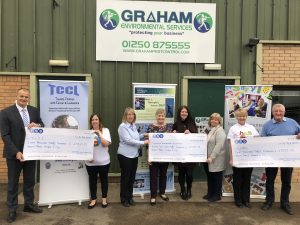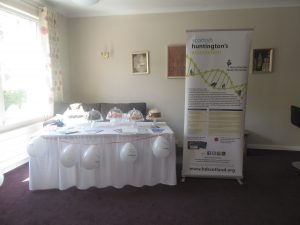To mark the occasion of Scottish Huntington’s Association turning 30 in 2019 we’re aiming to get 30 companies to sign up and support us! We’re doing this because we need to protect the services that are making such a difference to the HD community and build a better HD Scotland for a future where everyone has equal access to a high quality level of support. No one should be alone in facing the complex challenges of HD.
Here are some great ideas of ways your workplace or business could support SHA in 2019!
Nominate us for charity of the year!

Elaine Mackenzie from Graham Environmental Service did this for the year 2017 and what followed was incredible. We were chosen as one of three charities and received a donation of £8000 from a whole series of activities throughout the year including golf days, pop up charity shops, balls, quizzes and more! Does your work have a charity of the year (or month?) scheme? #support
Organise a cyclethon in the office!
The charity committee at Tepnel pharma services organised a cyclethon in 2016 with phenomenal results! Not only did their whole staff team get engaged by taking part, sponsoring or cheerleading but they raised over £2000! They had great support from a local gym who provided the bikes and then the fab cyclers dedicated time at the end of each day over a week to reach their set distance between them! . You could organise something similar and involve all your colleagues. This would be great team building with loads of fun, never mind improving your health and wellbeing. #cyclethedistanceonthespot #dedication
Round up a team to take part in a sponsored event!
The fantastic four from Blackadders LLP Dundee office teamed up to take on the Edinburgh Marathon last year. Doing it together meant they could keep each other motivated for both training and fundraising – a bit of healthy competition goes a long way! It was also a great way to support their colleague by showing they really cared! #teamwork
Ask your employer about match funding!
Virgin London Marathon participants asked their employers to match fund their fundraising and increased their amazing efforts by over £3,000. It is always worth asking your employer if they support their employees fundraising efforts. We are happy to post about, employer and employees support, gaining recognition for all involved. #amazingemployers
Host a SHAre tea for HD Party!

Who can resist a cuppa and a cake?! Planning a tea party can be done anywhere, home, school, university, work or on the street. One of our nursing homes who support our work, held a tea party in their café and brought carers and their loved ones together with kids and grandkids taking part too…Great fun for all generations and bring people together in an informal and relaxed way. Start the chat today and organise a SHAre tea for HD tea party and find out more about people you care about, all the while supporting an incredible cause. #startthechat
Organise a raffle and/or tombola!
A large financial business used a Friday morning to organise tombola and staff from all departments queued up to take their chance on winning some of the amazing prizes on offer. This took up less than an hour of staff time, raising £350 of which the employer matched funded £350 making an incredible total of £700. Not too much time was taken up but an incredible outcome for cause and helping to improve staff motivation and moral by doing something for others. #feelproud



